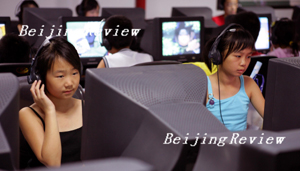
The Web 2.0 buzzword, having gathered speed in the United States in recent years as a way to describe new, more collaborative Internet applications, is attracting the attention and money of a batch of Chinese start-up firms.
But will it attract the people?
Late last year, the China Internet Society released a report that tracked this second major round of Internet boom. The findings of the report, titled China Web 2.0 Current Situation and Development Trend, indicate little awareness in China of the Web 2.0 concept, with 73.3 percent of respondents showing an ignorance of the idea or its applications.
Despite this, major Internet companies, entrepreneurs, portal sites and foreign venture capital all seem to be angling to get in on this potential market, with confident, even aggressive plans. Still, whether Web 2.0 is really the next big thing remains a big question mark.
Baby steps
Blogging is considered the Web 2.0 entry point for Chinese Internet users. With a blog, a person is involved in the creation of information, rather than just staring at static web page, a core idea of this second generation of Internet.
Applications that make it relatively simple to post blogs have lowered the entry bar for writing or posting photos online, and over the past few years the blogging trend has injected excitement into the Internet industry, giving rise to a new generation of entrepreneurs.
In 2004, there were fewer than 10 websites hosting blogs in China, but now the number is nearing 100, in addition to portals providing blog spaces for users. These sites have been the beneficiaries of all the attention. For example, Blogcn.com, a major blog service provider, received coverage in BusinessWeek magazine at almost the same time that Tooduo.com, which means “potato” in Chinese, a leading podcasting site (a way to publish and download audio files), was written about in The New York Times.
“Still, blog hosting websites in China earn revenue mainly from the mobile WAP [wireless] service and advertisements, far from the core competencies of Web 2.0. To understand the essence of Web 2.0, we still have a long way to go,” Hu Yanping, Director of the Communication and Development Center of the China Internet Society, said in an interview with Beijing Review.
Venture capital comes
Alongside the buzz, investors are emerging for market shares through backing Web 2.0-related startups.
Oak Pacific Interactive, formerly known as ChinaInterActiveCorp., announced in early April that it had finished a new round of financing worth $48 million from a consortium of leading global private equity and venture capital firms.
Oak Pacific runs a number of well-known Chinese websites that fall under the Web 2.0 category, such as Mop.com (where users post photos), Uume.com (a social networking service), DoNews.com (a popular online community) and wowar.com (a well-known gaming site).
According to Joseph Chen, Chairman and CEO of Oak Pacific, the new funds will be used to expand the company’s portfolio of digital entertainment assets and build brand awareness. Oak Pacific sees itself as a leading Web 2.0 platform for its offerings in online advertising, wireless value-added services and broadband entertainment options.
Apart from just being the new generation of Internet usage, Web 2.0 is also changing the operational formula of media and communications companies.
| 